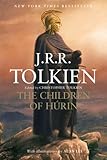I was first exposed to Tolkien a few gabazillion years ago, in fifth grade, when my teacher decided to read “The Hobbit” to our class – a work which we quickly devoured with gusto. That, of course, lead her to read the Lord of the Rings (many of us purchased our own copies) which, in turn, lead to the life-long admiration and fascination with anything Tolkien. Nearly four decades later (ugh!), The Lord of the Rings and the Hobbit remain my uncontested favorite books of all time – I’ve read them at least ten times (and each time still find something new in them).
Even so, I’ve found some of Tolkien’s other books to be quite academic (with regard to both language and construction) and, to be quite honest, rather dry. That does not; however, make me disdain them; rather, they are simply less enjoyable to read. Many of these have been compiled, posthumously, from the author’s obviously extensive notes and drafts that he compiled during his lifetime and, when reassembled into a narrative form remain rather pedantic; “The Children of Húrin” is yet another example.
While the story is a tragic one – in fact, it may be may be one of Tolkien’s darkest tales, it also shows the genius of the author as he created his epic tales of Middle Earth. The problem with that; however, is that like so many of his other stories (e.g., The Silmarillion), this tome is filled with an extraordinary number of genealogies compounded by the fact that many of the characters (especially the main ones) are continually changing their names – not dissimilar to that which occurs in the Bible. At times, so much effort must be made to identify the key figures, that reading becomes a real chore.
In many ways, reading this book seems somewhat analogous to examining the rough drafts of an exhaustive composition by a masterful composer; the working versions of Beethoven’s Fifth Symphony (not my personal favorite) actually sounds laughable prior to the final polished opus. Audiences were not meant to savor anything but the composer’s finished work: the same seems to apply to many of Tolkien’s pre-Hobbit Middle Earth stories.
All in all, I would have to recommend this book to serious Tolkien fans, but only after they have developed a mature grasp of his true masterpiece – Lord of the Rings.

